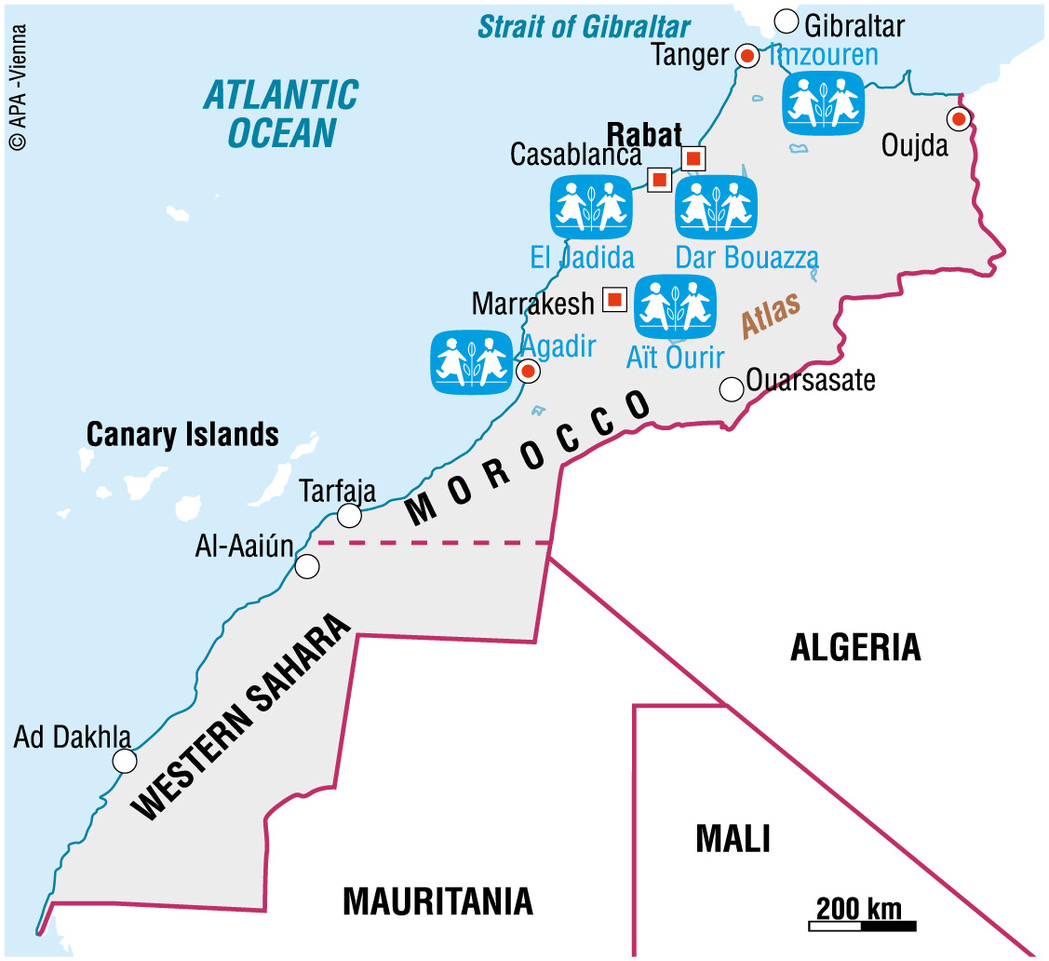
"Good things happen when people do more than they have to" Hermann Gmeiner, Founder of SOS Children’s Villages
Thank you for your interest in becoming part of the Mount Toubkal Challenge Team and aiming high for SOS Villages d'Enfants Monde. By joining the team you are becoming part of an experience that you will never forget and making a lifetime’s difference to children served by SOS in Morocco.
The 6-day adventure begins on the morning of Monday 8th April 2024 departing from Luxembourg Airport and flying to Marrakech Airport via Munich - arriving in the late afternoon and being transferred to our hotel in Marrakech. That evening, you will have a final pre-trek briefing before the expedition begins the following day.
The next morning, you will travel by road on a journey of approximately 2 hours to Imlil to begin the exciting trekking challenge. Our trekking journey will take place over 3 days and take you to the highest peak of the Atlas Mountains - taking you from 1,740m at the beginning of the trek to 4,167m at the summit before descending back to 1,740m. Your trekking days will include:
Day 1: 12km / 5 - 6 hours / 1,740 - 3,207 metres
Day 2: 8km / 6 - 7 hours / 3,207 - 4,167 - 3,207 metres
Day 3: 12km / 4 - 5 hours / 3,207 - 1,740 metres
At the conclusion of thre trek when reaching Imlil, you will travel by road on the 2 hour journey back to Marrakech. The afternoon will be spent at leisure and you will enjoy a celebratory team dinner that evening to reflect on the incredible experience enjoyed over the previous 3 days.
The following day, you will have the opportunity to visit the amazing SOS Children's Village near Marrakech to provide a chance to see first-hand how big a difference is being made to each child served by the SOS team in Morocco - and how valuable your fundraising efforts are in supporting this incredible organisation.
The next and final morning will be spent at leisure before transferring to Marrakech Airport for the international flights back to Luxembourg via Frankfurt, arriving on the late evening of Saturday 13th April 2024.
Hiking through the Atlas Mountains and up to the peak of Mount Toubkal requires no technical experience or equipment. It is however a considerable and, at times, gruelling challenge. The ascent is a tough test both physically and mentally, and includes time spent at high altitude - with a maximum altitude of 4,167m. Each trekking day will include between 4 and 8 hours of trekking over changeable, uneven and challenging terrain, so a good level of physical fitness and a strong will is therefore required, and advance training and preparation is advised to help you achieve your goal and enjoy the experience of doing so.
To download the full Terms & Conditions click here.
To book your place click here.
The provisional cost of the trip is €2350. This includes international flights from and to Luxembourg Airport, transfers and travel, accommodation, meals, trekking fees, guides and fully supported expedition costs. It does not include transport to and from Luxembourg Airport, personal clothing and equipment, visa processing fees, travel insurance, vaccines and medication, or personal expenses – including drinks. The final itinerary and associated trip costs is subject to change until finalised.
In addition to trip costs, each member of the team is asked to fundraise €1500 (or more where possible) in sponsorship money to support SOS projects in Morocco. You can find out more about SOS Villages d'Enfants Monde by clicking here.
LydiaMantler-7910.jpeg)
To confirm your place on the Challenge Team, please select ‘Book Your Place’ and complete the booking form. No up-front deposit is initially required - we are initially building a team for this exciting SOS Villages d'Enfants Monde Toubkal Challenge, and hope that you will join us. Upon having confirmation of a team, we will liaise with all team members with instructions for paying the trip cost balance which will be due no later than two months in advance of departure.
To download the full Terms & Conditions click here.
To book your place click here.
Find out more about the challengers or make a donation by clicking on a picture below:

SOS Villages d’Enfants Monde is a Luxembourgish association, which belongs to SOS Children's Villages International, the worldwide federation of SOS Children's Villages associations.
SOS Children’s Villages International is an independent, non-governmental, social development organisation that provides care and support for children and disadvantaged families. Present in 136 countries and territories around the world, about 1 million children and youth benefit from SOS programmes. 70 years of experience in supporting children without parental care and those at risk of losing it have given the organisation a deep understanding of how to care for children who need someone and how to help prevent the breakdown of parental care. Innovating alternative childcare, strengthening families, empowering young people and advocating for children are a few of SOS Children’s Villages International’s strategic objectives. These objectives are achieved through SOS Children’s Villages, SOS Kindergartens and Schools, as well as youth facilities providing vocational training and thus preparing youngsters to a life on their own. Family Strengthening Programmes where communities are supported to become self-sufficient as well as Emergency Response Programmes where SOS Children’s Villages helps with long-term interventions are also major parts of our mission. The organisation helps to build a sustainable future for all children, advocating for their rights and encouraging them to actively take part in decision making processes.
SOS Children's Villages has been supporting Morocco's vulnerable young people and children since the early 1980s. At present, SOS Children's Villages is supporting families, young people and children in Morocco in Imzouren, Rabat, El Jadida, Marrakesh and Agadir. Since its creation, 500 young people have become independent thanks to the local tem’s work.

History & politics: Morocco is a constitutional monarchy located in North Africa. The country is governed by an elected government, with the King holding major executive power. The country's capital is Rabat, although Casablanca continues to be the largest Moroccan city. For many years, Morocco was subject of rivalries between European powers. The Spanish occupied the country's northern part in 1860. Only around five decades later, in 1912, the French gained control over vast parts of the country. That same year, the "Treaty of Fez" was signed and Morocco thus divided into a French and Spanish protectorate until it finally gained full independence and sovereignty in 1956. In the mid-1990s, Morocco developed into a transit and host country for asylum seekers and illegal labour migrants from sub-Saharan Africa and South Asia trying to reach Europe via southern Spain, Spain’s Canary Islands, or Spain’s North African enclaves, Ceuta and Melilla. The launching of a regularization program in 2014 legalized the status of some migrants and granted them equal access to education, health care, and work, but xenophobia and racism remain obstacles.
Population & Economy: Morocco’s population is growing but at a declining rate, as people live longer and women have fewer children. Infant, child, and maternal mortality rates have been reduced through better health care, nutrition, hygiene, and vaccination coverage, although disparities between urban and rural and rich and poor households persist. Young adults (persons aged 15-29) make up almost 26% of the total population and represent a potential economic asset if they can be gainfully employed. Currently, however, many youths are unemployed because Morocco’s job creation rate has not kept pace with the growth of its working-age population. Most youths who have jobs work in the informal sector with little security or benefits. Economically, it benefits from low labour costs and its proximity to Europe. The country is one of the largest exporters of phosphate, a raw material that has secured economic stability over many years.
Human Development & Rights: Although not to the same extent as in many of Africa's Sub-Saharan countries, poverty in Morocco does exist. It is predominantly a rural phenomenon. Tens of thousands in rural and semi-rural parts of Morocco remain without access to potable water, decent housing, sanitation or medical assistance. Over the last years, there have been noticeable improvements in terms of human development but the gap between urban and rural areas has widened. Today, the country ranks 123rd in the UN’s Human Development Index. Recent constitutional reforms have improved provisions on human rights, e.g. by criminalising torture and arbitrary detention, strengthening judicial independence and guaranteeing fair trial rights. However, further reforms are needed to ensure that these provisions are indeed implemented.
Children At Risk: In Morocco, nearly 30% of the population are less than 14 years old. Many children are affected by rising levels of poverty and child neglect. Over recent years, the country has introduced a number of campaigns to tackle the problem of child labour. Nonetheless, thousands of children continue to be subjected to exploitative practices. While boys traditionally work in agriculture, girls are often forced into domestic servitude in exchange for money. Many girls experience sexual and physical abuse and are not allowed to leave the house. The majority of working children do not receive an education. Without an education, many of these children will face grave difficulties once they become adults. As giving birth out of wedlock is illegal in Morocco, many single women abandon their babies after birth to avoid penalties (up to one year of imprisonment). Around 20 – 25 babies are abandoned per day. Abandoned children live through harsh conditions in addition to lack of parental love and affection which leaves a negative impact on their psychological state. According to Morocco’s High Commission for Planning, there are an estimated 30,000 orphans in Morocco and 60,000 children live in institutions.
LydiaMantler-7917.jpeg)
Family-Based Care: Children who have lost parental care can find a home in families in a SOS Children’s Village or foster families in their community. Brothers and sisters grow up together and receive all the support they need: they go to local schools and take part in neighbourhood activities which ensures that they are well integrated into the community. In 2018, 553 children received alternative quality care.
Support for Young Adults: The SOS Youth Programmes provide young people with support until they are able to live independently. Great attention is paid to ensure they receive the right kind of education and training so that they can get a job. The team manages a living space for 29 young adults with specific needs near Casablanca, allowing them to live a life in dignity.
Strengthening Families: The SOS Family Strengthening Programmes aim to strengthen existing family ties and to enable children who are at risk of losing the care of their family to grow within a caring family environment. In 2018, the team assisted 269 children and their families.
Got a question? We hope you will find the answer in the information below. However, if you have any further queries, please complete the online enquiry form and we will answer your question as soon as possible.
Click a question below to expand the answer.